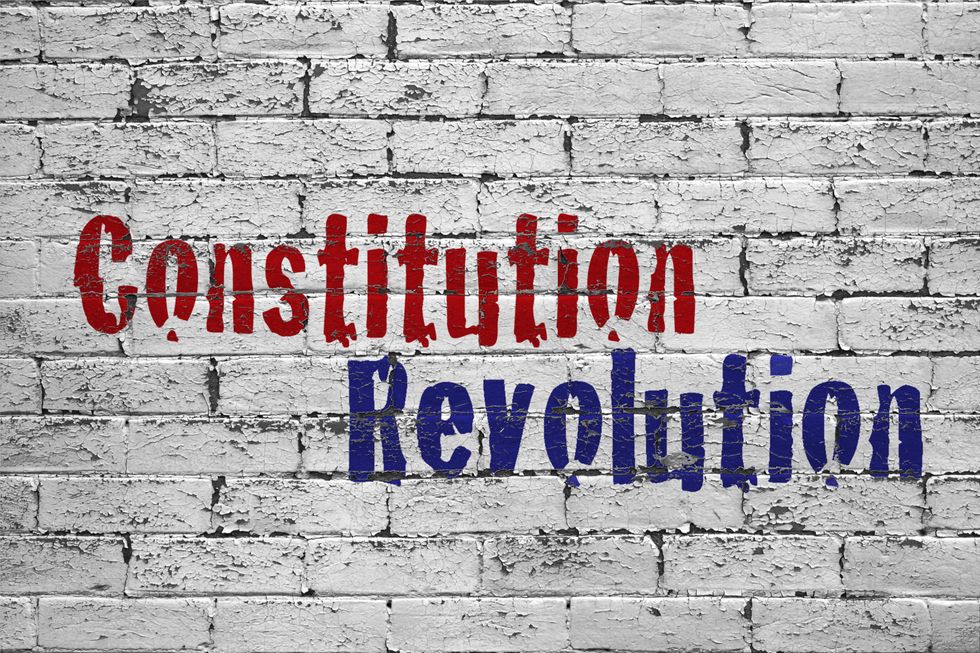
Photo Courtesy of Author.

This post is the continuation of a weekly Constitution Revolution series for TheBlaze.com and TheBlaze Radio’s Chris Salcedo Show. To see last week’s lesson, click here.
–
Is Donald Trump an uninformed buffoon when it comes to immigration like his critics claim? Or is he right to question the conventional wisdom when it comes to the 14th Amendment?
Since the topic of birthright citizenship has been all over the news, now is a great time to pause my Constitution Revolution series and clarify what the 14th Amendment means.
Before we get into that, let me lay down one disclaimer that you have to remember in order to understand this post: all I intend to do here is demonstrate the meaning of the 14th Amendment. That’s it.
 Immigration reform advocates stage a demonstration in front of the Immigration and Customs Enforcement (ICE), office on June 13, 2013 in Newark, New Jersey. Immigrant advocacy groups nationwide are scheduling protests ahead of Father's Day to draw attention to the high number family separations due to the deportation of parents as undocumented immigrants.Credit: Getty Images
Immigration reform advocates stage a demonstration in front of the Immigration and Customs Enforcement (ICE), office on June 13, 2013 in Newark, New Jersey. Immigrant advocacy groups nationwide are scheduling protests ahead of Father's Day to draw attention to the high number family separations due to the deportation of parents as undocumented immigrants.Credit: Getty Images
Keep in mind that whatever your opinion is on illegal immigration, it has absolutely no impact on the meaning of the 14th Amendment. Whether you love the idea of birthright citizenship for the children of illegal immigrants or you hate it - it doesn’t matter.
Truth is truth and the 14th Amendment means what it means. That’s what I intend to cover in this post.
With that out of the way, let’s take a look at the relevant part of the 14th Amendment:
“All persons born or naturalized in the United States, and subject to the jurisdiction thereof, are citizens of the United States and of the State wherein they reside.”
The dominant belief among the mainstream media and the political class in Washington, D.C. is that this clause creates a Constitutional requirement for us to grant birthright citizenship to illegal immigrants.
However—and you might want to sit down for this—the mainstream media and the politicians are dead wrong.
In this case, it only takes two quick points to demonstrate very clearly that the 14th Amendment does not require us to give citizenship to someone just because they were born within the United States.
There are two requirements that a person has to meet before they are Constitutionally guaranteed citizenship in this clause:

So being born here isn’t enough on its own.
But that brings up the all important question: What did the framers of this amendment mean by “subject to the jurisdiction thereof?”
Fortunately, that’s not too difficult to figure out because they defined it very clearly during the debate in the Senate.
Sen. Lyman Trumball of Illinois - who was one of the main writers of this section of the 14th Amendment - addressed that question directly:
“What do we mean by ‘subject to the jurisdiction of the United States?’ Not owing allegiance to anybody else. That is what it means.”
Sen. Reverdy Johnson of Maryland was just as specific:
“Now, all that this amendment provides is, that all persons born in the United States and not subject to some foreign Power—for that, no doubt, is the meaning of the committee who have brought the matter before us—shall be considered citizens of the United States.”
So in order to be guaranteed birthright citizenship a person has to be born in the United States and owe no allegiance to any foreign country.
Obviously, people who come into this country illegally owe at least some allegiance to their home country—and so would their children. Because of that, the children of illegal immigrants do not meet both of the requirements necessary to be guaranteed citizenship by our Constitution.
But there’s an even easier way figure out if the people who wrote the 14th Amendment intended for it to grant birthright citizenship to the children of people who entered this country illegally.
If it were possible, what would be the best way to find out exactly what a given part of the Constitution actually means? To go back and ask the people who wrote it what they intended, right?!
After all, a part of the Constitution can only mean what the people who wrote and ratified that part of the Constitution intended it to mean. So what better way could there be to know for sure what an amendment means than to directly ask the person who wrote it?
Well in this case, we can almost do that.
Sen. Jacob Howard of Michigan - one of the primary authors of this part of the 14th Amendment - is on record telling us exactly what he intended this clause to mean:
“This amendment which I have offered is simply declaratory of what I regard as the law of the land already, that every person born within the limits of the United States, and subject to their jurisdiction, is by virtue of natural law and national law a citizen of the United States. This will not, of course, include persons born in the United States who are foreigners, aliens, who belong to the families of embassadors or foreign ministers accredited to the Government of the United States, but will include every other class of persons.”
So according to one of the people responsible for writing this clause, it was not intended to give birthright citizenship to “foreigners” or “aliens”—and without question the children of illegal immigrants would be included in at least one of those categories.
It’s amazing that there is so much controversy over this clause of the Constitution because the evidence is very straightforward. There is simply no way that the people who wrote and ratified the 14th Amendment intended to grant birthright citizenship to citizens of foreign countries who entered the United States illegally.
I certainly understand that you might personally like the idea of birthright citizenship for the children of people who are here illegally. You might passionately believe that Congress should make it our official policy. That’s fine, you are free to make that case to the American people.
But to claim that the Constitution guarantees birthright citizenship to the children of illegal immigrants is simply inaccurate.
Chad Kent is an author and speaker with a unique style that makes the Constitution simple and fun. Listen to Chad every Saturday during The Chris Salcedo Show on TheBlaze Radio, visit his web site at www.ChadKentSpeaks.com, and like his Facebook page at www.facebook.com/theconstitutionguy.
–
TheBlaze contributor channel supports an open discourse on a range of views. The opinions expressed in this channel are solely those of each individual author.